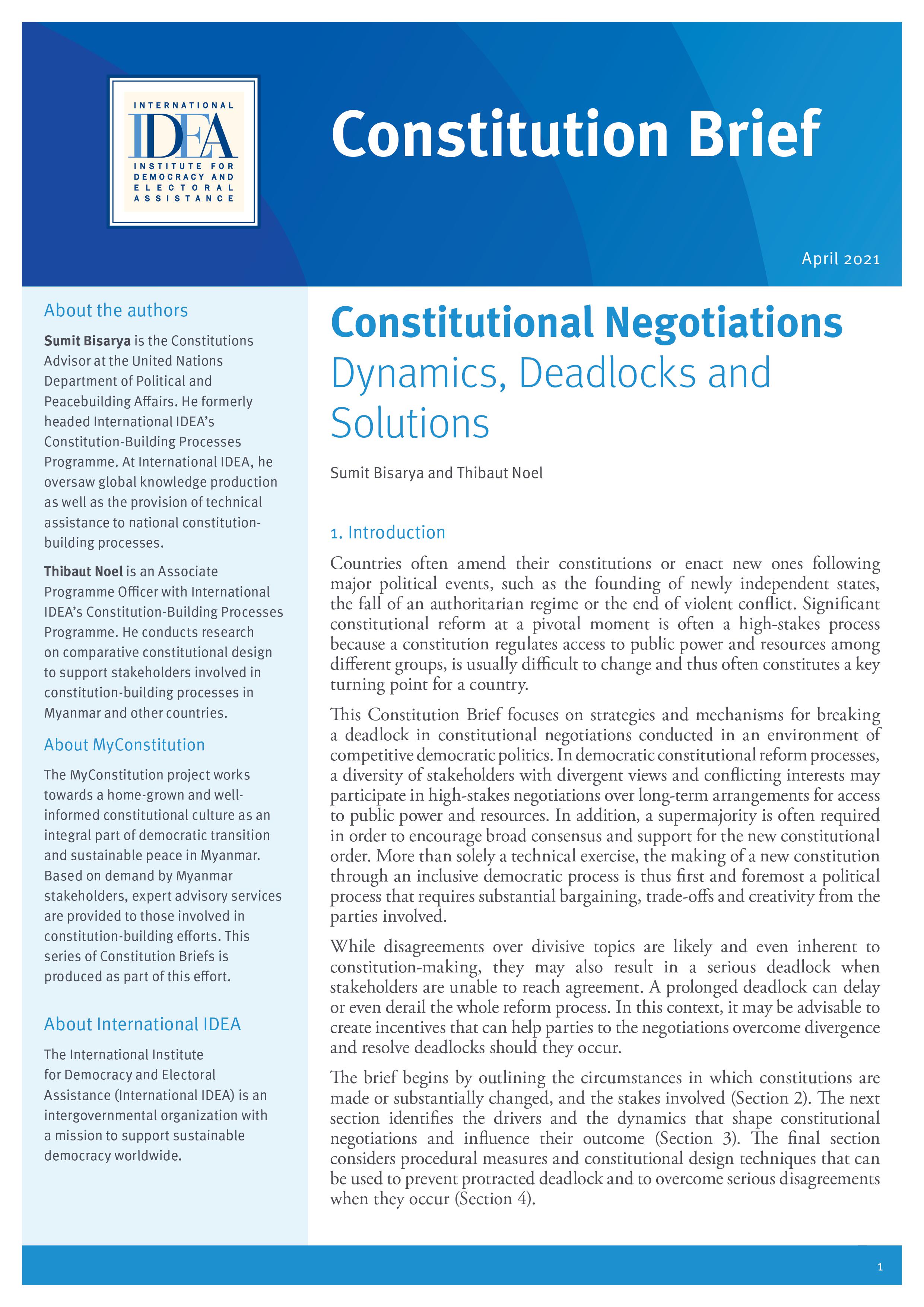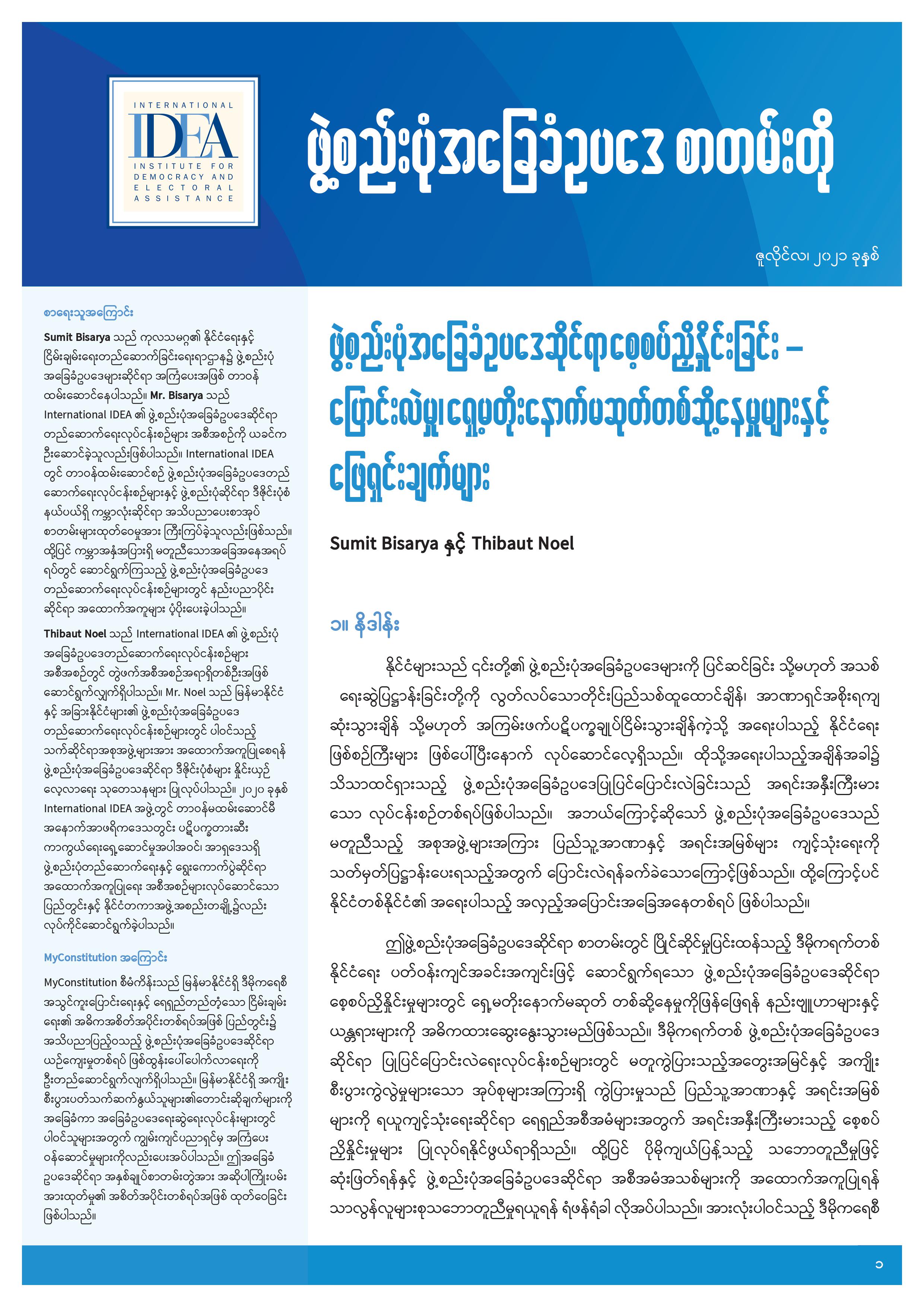CONSTITUTIONAL NEGOTIATIONS: Dynamics, Deadlocks and Solutions


နိုင်ငံများသည် ၎င်းတို့၏ ဖွဲ့စည်းပုံအခြေခံဥပဒေများကို ပြင်ဆင်ခြင်း (သို့မဟုတ်) အသစ်ရေးဆွဲပြဋ္ဌာန်းခြင်းတို့ကို လွတ်လပ်သောတိုင်းပြည်သစ်ထူထောင်ချိန်၊ အာဏာရှင်အစိုးရကျဆုံးသွားချိန် (သို့မဟုတ်) အကြမ်းဖက်ပဋိပက္ခချုပ်ငြိမ်းသွားချိန်ကဲ့သို့ အရေးပါသည့် နိုင်ငံရေးဖြစ်စဉ်ကြီးများ ဖြစ်ပေါ်ပြီးနောက် လုပ်ဆောင်လေ့ရှိသည်။
ထိုသို့အရေးပါသည့်အချိန်အခါ၌ သိသာထင်ရှားသည့် ဖွဲ့စည်းပုံအခြေခံဥပဒေ ပြုပြင်ပြောင်းလဲခြင်းသည် အရင်းအနှီးကြီးမားသော လုပ်ငန်းစဉ်တစ်ရပ်ဖြစ်ပါသည်။ အဘယ်ကြောင့်ဆိုသော် ဖွဲ့စည်းပုံအခြေခံဥပဒေသည် မတူညီသည့် အစုအဖွဲ့များအကြား ပြည်သူ့အာဏာနှင့် အရင်းအမြစ်များ ကျင့်သုံးရေးကို သတ်မှတ်ပြဋ္ဌာန်းပေးရသည့်အတွက် ပြောင်းလဲရန် ခက်ခဲသောကြောင့်ဖြစ်သည်။
ဖွဲ့စည်းပုံအခြေခံဥပဒေ တည်ဆောက်ရေးတွင် သဘောထားကွဲလွဲသည့် အကြောင်းအရာများအပေါ်တွင် သဘောမတူညီမှုများ ဖြစ်ပေါ်နိုင်သကဲ့သို့ ယင်းကိစ္စရပ်များအပေါ် သဘောတူညီမှုမရရှိပါက ဆွေးနွေးမှုများ ရှေ့မတိုးနောက်မဆုတ် တစ်ဆို့သည့်အခြေအနေသို့လည်း ရောက်ရှိစေနိုင်ပါသည်။ ထို့သို့တစ်ဆို့မှုများ အချိန်ကြာမြင့်လာသောအခါ ပြုပြင်ပြောင်းလဲရေးလုပ်ငန်းစဉ်တစ်ခုလုံးအား နှောက်နှေးနိုင်စေခြင်း (သို့မဟုတ်) လမ်းကြောင်းလွဲချော်သည်အထိ ဖြစ်စေနိုင်ပါသည်။ ဤသို့သော အခြေအနေတွင် စေ့စပ်ညှိနှိုင်းမှုများတွင် ပါဝင်သည့် အစုအဖွဲ့များမှ သဘောထားကွဲလွဲမှုများကို ကျော်လွှားရန်နှင့် ဖြစ်ပေါ်နေသည့် ရှေ့မတိုးနောက်မဆုတ်တစ်ဆို့နေမှုများကို ဖြေရှင်းရန် အထောက်အကူဖြစ်စေမည့် ဆွဲဆောင်မှုရှိသော ညှိနှိုင်းမှုများ ဖန်တီးရန် အကြံပြုရပါလိမ့်မည်။ ဤဖွဲ့စည်းပုံအခြေခံဥပဒေဆိုင်ရာ စာတမ်းတွင် ပြိုင်ဆိုင်မှုပြင်းထန်သည့် ဒီမိုကရက်တစ်နိုင်ငံရေး ပတ်ဝန်းကျင်အခင်းအကျင်းဖြင့် ဆောင်ရွက်ရသော ဖွဲ့စည်းပုံအခြေခံဥပဒေဆိုင်ရာ စေ့စပ်ညှိနှိုင်းမှုများတွင် ရှေ့မတိုးနောက်မဆုတ် တစ်ဆို့နေမှုကို ဖြန်ဖြေရန် နည်းဗျူဟာများနှင့် ယန္ဒရားများကို အဓိကထားဆွေးနွေးထားပါသည်။
Countries often amend their constitutions or enact new ones following major political events, such as the founding of newly independent states, the fall of an authoritarian regime or the end of violent conflict.
Significant constitutional reform at a crucial moment is often a high-stakes process because a constitution regulates access to public power and resources among different groups.
While disagreements over divisive topics are likely and even inherent to constitution-making, they may also result in a serious deadlock when stakeholders are unable to reach agreement. A prolonged deadlock can delay or even derail the whole reform process. In this context, it may be advisable to create incentives that can help parties to the negotiations overcome divergence and resolve deadlocks should they occur. This Constitution Brief focuses on strategies and mechanisms for breaking a deadlock in constitutional negotiations conducted in an environment of competitive democratic politics.